The Decision- Adding a Dog to Your Family
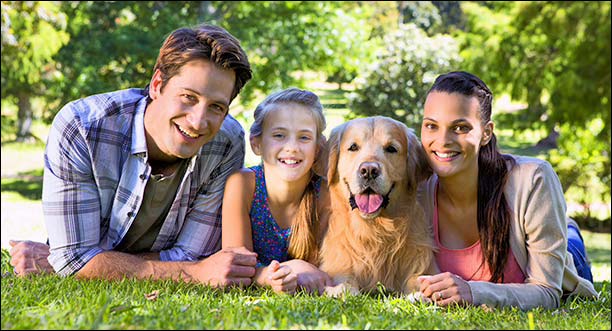
The decision to purchase a dog for your family is a big one, it’s a bigger decision that deciding to buy a new car or a new home. This decision is one that many people don’t realize it’s magnitude until after they have the dog. This is quite unfortunate for many of these dogs because some of them end up in a pound somewhere or being sold or given away to other families, or worse put down or neglected.
The idea of a puppy in the home is one that kids everywhere beg their parents for – they ask and plead, promising to take care of it fully. Parents usually know better – the novelty of a puppy only lasts for a short period of time, or until the kids have to pick up their first puppy present on the living room carpet.
The fact of the matter is that kids can’t actually fully care for a puppy, a puppy needs an adult who can train and teach in house training and obedience.
There are a number of things that you need to research before you decide to purchase a dog, and it starts right in your own home.
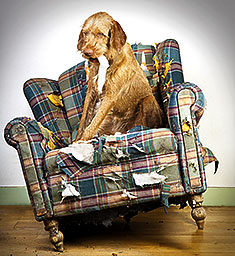
Step One – Look Around Your Home
The first step to the decision is to look around your home, even if the decision has already been made, take a last look at the way your home used to look, because in the near future, it probably won’t look the same once you have a puppy.
If you are quite fond of your furniture, you may want to look at where you can house the puppy until it learns not to chew the legs off your chairs and the arms on your sofa – if you don’t have an area like this, you will have to consider other methods of containment or rethink your decision.
Take a look at your carpet. Remember, puppies don’t come house broken, and there is a pretty good chance that they will have an accident or two on your living room carpet. It’s not the end of the world, but you have to be willing to clean it up with pet odor spray for carpets or perhaps even a rug shampooer.
Do you have knick-knacks around your home? If they are low to the ground where a puppy could get to them, or easily knocked over onto the floor by a large beating tail or a running-out-of-control puppy, you will want to relocate these objects.
These steps are known as puppy proofing your home. If you have children, it is similar to baby proofing your home, except that it seems a little more extreme in some cases. Babies don’t ruin furniture and carpets, but puppies can.
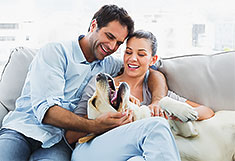
Step Two – Decide How Much Time You Have
Puppies take time – a lot of it. You should expect that your new puppy will require at least two hours of your time each and every day, including that of your children. All together, a puppy (depending on the type) can eat up to five hours of your time each day.
You will need to allot time each morning to take your puppy outside, have someone to be there through the day to take the puppy outside once every half an hour until they learn their housebreaking.
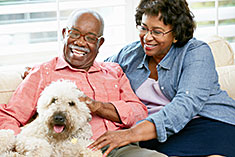
You will also have to allot time throughout the day and evening for walks, for a puppy, 15 minutes of a walk is plenty, but that should happen at least twice a day.
As you puppy gets older, those two walks a day will need to increase in time and intensity so that your dog has enough exercise and play time.
If your family can’t find two hours each day to care for your puppy, then the decision is made – a puppy isn’t right for you at this time. However, once you have established that everyone can and will allocate time to the puppy of at least two hours, not including extra play and training time, a puppy may fit well with your family.
Step Three – Time To Research Breeds
You can’t just run out to the pet store, pound or breeder and choose the cutest puppy you see. Choosing a puppy that is right for your family and lifestyle is the biggest decision of all.
Check out these resources here on Doggies.com:
-
Detailed information in our Breed Guides make it easy to narrow down the breeds that would fit your general needs.
-
Our Find-A-Breed tool lets you enter specific parameters and generates a list of links to breed guides with more information.
If you live in a small home with little or no yard space, owning a large breed dog that weighs well over 100 pounds is not ideal for you.
Each breed has it’s own characteristics that need to be considered, here’s a list of considerations that you should make with each breed of dog before choosing.

-
Size and weight – find out how much the dog will weigh approximately and how big you can expect them to get. You can research on the Internet to find information on different breeds right here in our large library of breed guides, and use our breed match tool to find breeds with traits that match you.
Disposition and personality – not all dogs are created equal. Some are labeled as better family pets, while others do well in a small family or adult only situation. Some dog breeds don’t tolerate children very well, while other breeds love children.
-
Health concerns – most dog breeds have a set of potential health concerns that you need to be aware of. Some of the most common and severe problems to watch for are hip, back, endocrine, nodal and ear problems. If you are planning on a registered bred puppy, you can check the lineage of the puppies parents to see if any problems have occurred in the line.
Intelligence – dog breeds have been categorized by their intelligence – some breeds are just smarter than others and pick up on training quicker than others. This will affect the time that it takes you to train your puppy and how much time you will have to devote to the overall training process for both housebreaking and obedience.
Step Four – To Crate or Not To Crate
Crate training is a subject that has been debated for decades – some trainers will tell you that it is necessary for a properly trained dog, while others will tell you that it is cruel to your animal. The fact is that crate training, when done properly, is a great training tool.
You must not leave your puppy or dog in a crate for too long – they can’t spend the entire day in their kennel, only being let out to eat and go outside to do their business. Puppies need affection and attention or they will go crazy and no amount of training, in a crate or not, will fix that.
Some dog breeds respond better to crate training than others, and for some dog breeds, crate training is a must. While researching your breed, you will likely find methods of teaching and training your new puppy and whether or not a crate is necessary.

Step Five – Consider Your Pocketbook
Dogs are expensive and not just to purchase. You will have to consider the costs of vaccinations and neutering or spaying your dog. It’s also important to have a cushion of funds for emergencies and vet bills that can crop up unexpectedly.
When you have done your research and decided on purchasing a puppy, it’s a fine time to introduce your puppy to your home and family.
You will have to decide on a training method either by enrolling in local puppy training classes, purchasing some self-help books for dog training or searching the Internet and magazines for information on training. Don’t forget that it is equally important to train your family how to socialize with your puppy as it is to train the puppy.
Have fun with your new puppy!
May you have many joyous years of companionship and friendship.
Find more articles for First Time Dog Owners here.
Doggies Den: Latest Articles
 Homemade Thanksgiving Treats for Your Dog
Homemade Thanksgiving Treats for Your Dog
NUTRITION We all want to include our dogs in our holiday celebrations, but hopefully, you're aware that sharing table scraps with your dog isn't always the best idea.
 Keeping Your Dog Safe during the Summer Months
Keeping Your Dog Safe during the Summer Months
HEALTH Summer is coming on fast, so it’s time to plan how you will keep your dog safe and healthy through the lazy, carefree, warm days.
 Vaccination Time Again-Keeping Your Puppy Healthy
Vaccination Time Again-Keeping Your Puppy Healthy
DOG HEALTH So you have your new puppy picked out. There are quite a few shots, treatments and examinations that will keep the newest member of your family healthy.
 Canine Thanksgiving Feast
Canine Thanksgiving Feast
NUTRITION With the wide variety of food at Thanksgiving dinner, chances are you'll want to give your dog something special, too. If you're contemplating what to feed your dog for the holiday, here is a guide to a great Canine Thanksgiving Feast.
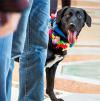 Dog Walking Tips Every Owner Should Know
Dog Walking Tips Every Owner Should Know
DOG FUN Walking your dog is not only crucial to keeping him healthy and happy, it strengthens the bond between your canine friend and his caregiver. There are a lot of obstacles out there. Don’t forget these simple tips to keep your walk fun and safe in the outside world.
 The Benefits of Physiotherapy for your Dog
The Benefits of Physiotherapy for your Dog
HEALTH The same techniques that physiotherapists use to treat a variety of injuries and conditions in humans have been adapted to suit animals with great success. Family pets, show dogs, and working dogs can all benefit greatly from physiotherapy. Dogs whose activities involve a lot of agility are especially susceptible to the types of problems that physiotherapy can address.
 The Decision- Adding a Dog to Your Family
The Decision- Adding a Dog to Your Family
FIRST TIME OWNERSBringing a dog into your family is a decision where many people don’t realize it’s magnitude until after they have the dog. There are a number of things that you need to research before you decide to purchase a dog, and it starts right in your own home.
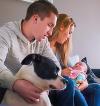 Bringing Your Dog Into Your New Baby's Life
Bringing Your Dog Into Your New Baby's Life
HEALTH Many believe that a dog and a new baby cannot happily coexist, so therefore the dog has to go. This is not necessarily the case.  A new baby does not mean you have to abandon your dog.

Doggies Den:
Most Popular Articles

Dog Pregnancy Symptoms
HEALTHIf you suspect your dog might be pregnant, check out part one in this series on pregnant dogs, where we cover pregnant dog symptoms.

Dog Birth
HEALTHIn the third article of our dog pregnancy series, we look at the wonderful, but messy, process of bringing newborn puppies into the world.

Indoor Dog Potties
DOG PRODUCTSIt's been a long day at work. You were so busy, you didn't even take time to eat a sandwich, let alone run home to let your dog out. You're on your way home, knowing the poor dog is crossing his or her legs by now, when your car breaks down, delaying you even further. Can't somebody make this easier?

Your Dog’s Digestive System
PHYSIOLOGYEver wonder why your dog eats so fast? Or why he eats gross things? Or why he gets sick to his stomach? Or why his waste stinks so bad? Some of these things are normal, some are not.

Canine Respiratory System
BREATHINGThe basic function of your dog's respiratory system is to bring oxygen in to and remove carbon dioxide from the body. Knowing the symptoms of respiratory diseases can help you help your stay healthy.
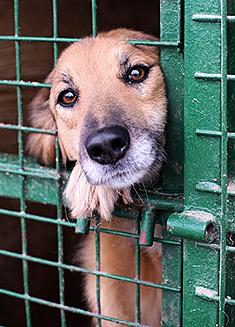
Shelter Dog Adoption Tips for Success
ADOPTION Are you intimidated by the prospect of "rescuing" a dog from a shelter? One reason that you may be wary of adopting a dog from a shelter is not knowing how to choose. Adopting a dog from a shelter can be a rewarding process, if you're prepared to do a reasonable amount of research.
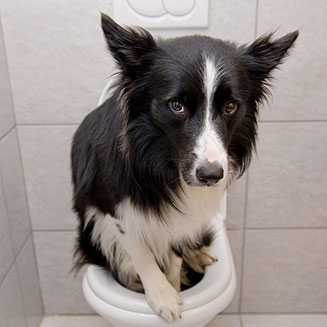
Canine Urinary Tract Infections
SYMPTOMS AND TREATMENTDoes your dog seem to be having trouble relieving his or her bladder? Learn how to recognize the signs of urinary tract infections and how to treat them before they spread.
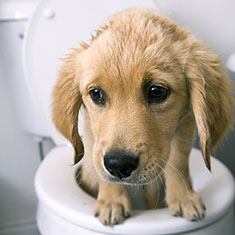
What to do for Dog Diarrhea
SYMPTOMS AND REMEDIESIf you have dogs in your house for any length of time, you have likely experienced at least one bout of dog diarrhea. Beyond the pain in the tuckus involved in cleaning up the mess, you should know what causes diarrhea, and when it's important to see the vet.

What to do for a Dog Bite
DOG BEHAVIOR Getting bitten by a dog can be scary, and you may be tempted to run around in circles for a while, trying to figure out what to do. Here's our guide to help you manage the situation.
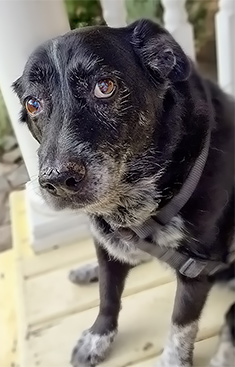
Top Ten Tips for Living with a Senior Dog
DOG HEALTH Bringing home a new puppy is so exciting, but it doesn’t take all that long for your exuberant puppy to grow into a senior dog who may have special needs. Here are the doggies.com top ten tips for taking care of your companion who has been with you through so much.
